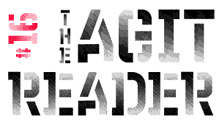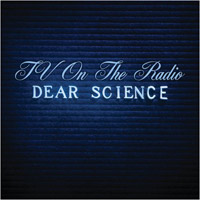
Dear Science
Interscope
In their relatively short career, TV on the Radio has thus far been never short of brilliant. Here is a band who restored my faith in rock & roll (I’m not kidding), their infusing of gospel and soul into indie rock’s tight confines a major feat. And they’ve done so with such righteous earnestness—with not a trace of hipster pretension in sight—that it’s impossible not to have become a true believer. With Desperate Youth, Bloodthirsty Babes and Return to Cookie Mountain, they put their watermark on rock music, creating a very now sound while tapping into something deeper.
That’s why it’s so disappointing then that the band’s new record, Dear Science is such a mixed bag. It’s as if TVOTR has lost its train of thought, as the album lacks the focused vision of its predecessors. In its stead is an album that tries too many things at once, doing few of them well in the process.
The record starts off well enough; “Halfway Home,” encircled by a fuzzy guitar and punctuated with handclaps and mechanized beats, is a mix of shoegaze whirl and electro-soul. The band takes its first wrong turn with “Crying” and finds itself in the midst of a disco jam. “Dancing Choose” is the record’s low point, an attempt at a hybrid of hip-hop and rock, or more accurately hip-hop and post-rock, given its Tortoise shelled bass nodes. In short, it’s as bad as it sounds on paper.
The TV men find their footing with “Stork & Owl.” Here a low-end rumble is juxtaposed with traipizing strings and an amorphic lullaby. And “Shout Me Out” is almost there as well, were it not stuck in a New Romantic mode. One of TVOTR’s greatest assets was its purity, and here they’ve traded that for artifice.
Stephen Slaybaugh
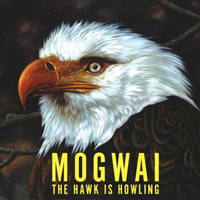
The Hawk Is Howling
Matador
Maybe it’s time for Mogwai to start plotting pop songs instead of brutal/beautiful post-rock epics. That’s not to say that The Hawk is Howling is short on epics; in the crunchy metal bombast of “Batcat” or the dawn-of-man twists of “Scotland’s Shame,” they haven’t sounded this sprawling since Come on Die Young. It’s just that in those monstrous monoliths they seem complacent, burning up past fumes. Assuredly though, Mogwai aren’t down for the count, or likely to pen lyrics to accompany a cheeky title like “I’m Jim Morrison, I’m Dead,” as they always find a way to urge the listener to look towards a mirage of what might be.
Most striking is what might have become of “The Sun Smells Too Loud,” where Kraftwerkian synths flirt with mellifluous pop riffs, taunting with the hope of handclaps and teenage choral shouts, and “Danphe and the Brain,” another saunter through space that drips more balladry than sonic saga. The tape loops and twinkles that back “King’s Meadow,” the vibes and desert howl of “Local Authority”—each soak in rich textures that rely most on electronic intimacy and striking emotion rather than the stand-by overdrive pedals of the past. While The Hawk is Howling may not stand out among the band’s thick discography, it’s still thrilling to see Mogwai confident in their experiments, evolving (albeit slowly) into reliable veterans of their trade.
Kevin J. Elliott
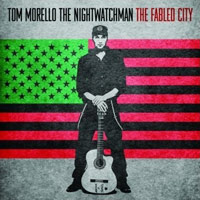
The Fabled City
Red Ink
Tom Morello’s record label would like you to believe that his songwriting is as spectacular as the fireworks of his guitar playing. No two ways about it, though, they’re wrong.
Now, if you’re the kinda guy who thinks Rage Against the Machine will long be hailed as one of the really significant, breakthough acts of the late 20th century, if you’re the kinda guy who’s convinved that the Rage reunion album will put all these pathetic indie rockers in their place, then maybe The Fabled City, ham-fisted as it is, will suit you just fine. And if you think that maybe Ben Harper’s recent work has been a little too authentic, then maybe you’d like what Tom Morello does as his alter ego, The Nightwatchman.
I, however, can’t stand it. His deep “one man revolution” voice is a put-on, and it constantly shows. He depereately wants to be some kind of modern day Woody Guthrie, so he writes “Whatever It Takes” on his guitar and then chants it again and again. He sticks with that tactic for a lot of the tracks, notably “The King of Hell,” intoning “The devil is not the king of hell” enough times that you alomst begin to think it means something.
Musically, though, Tom Morello is a name you can rely on, right? Well, not in this case. Wow. Most of the tracks are boring, mid-tempo rock songs with repetitve chords and minimal flourish, covering thoroughly well-trod ground with little or no invention. It’s sad too. Morello seems to be taking the project so seriously that there’s no room for any fun. And those details—fun, invention, flourish—those are exactly what puts his guitar playing so far ahead of the pack.
Yes, Serj Tankian and Shooter Jennings show up in the last third of the album, and Serj esepcially manages to lift the thing out of the dole-drums for a moment. But seriously, if one chorus sung by the guy from System of a Down is the most exciting part of your own wannabe-Johnny Cash song, then you’re just not trying too hard, aren’t you?
Matt Slaybaugh
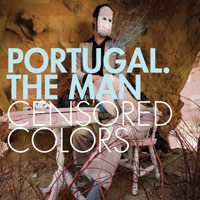
Censored Colors
Approaching AIRballoons/Equal Vision
The first synthesizer-swoosh into layered vocal harmony, blasting into a noisy guitar, drum, bass intro, then clearing up with a tinkly Rhodes underneath John Baldwin Gourley’s lyrics “I remember things, not many things,” immediately gives this album a larger than life feel. Layered vocals run throughout the album, recalling the Verve on “Colors,” TV On The Radio on “And I,” and nearly nicking a melody from 38 Special’s “One In A Million” on “Our Times.” Gourley, in falsetto mode, manages to sound like a spaced out Jeff Buckley or a stone cold sober Vampire Hands, maybe even sultry like Shirley Manson. The guitar even takes a tip from Mick Ronson’s wistful Ziggy Stardust era solos. This record reaches far and wide, and fathoms underneath any of the aforementioned reference points. Judging strictly from one of the lines currently lodged in my brain (“I was born in 1989”), Gourley is a youngster. This leads to an emotive drama that only a 20-year-old could conjure. This record captures that close-your-eyes-and-pour-out-your-soul exuberance before it turns in to a jaded fear of honest self-expression.
Michael P. O’Shaughnessy
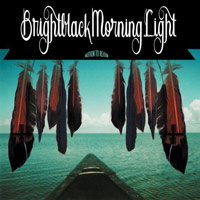
Motion to Rejoin
Matador
Though it’s hard to describe exactly how Motion to Rejoin differs from Brightblack Morning Light’s 2006 self-titled master-dose, it’s just as easy, if not easier to get sucked into their narcotic haze. In an effort to top, or simply expand upon, their bohemian personas, Rachel Hughes and Nathaniel Shineywater (Rabob and Nabob to the choir) recorded Motion to Rejoin entirely with solar energy. That baking effect is felt so deeply throughout, you can almost sense when the clouds were obscuring the panels or the sun’s scorch roused the overall togetherness of the proceeding. There are sweeping lulls that could be symbolic of the duo’s exhaling, but they’re usually inhaling the conductive warmth and basking in sweat-tent awakenings.
Lazer light shows were invented for this kind of “teepee hotel wisdom,” as the duo seems set on a constant existential quest for enlightened freedom of the senses. “Opression Each” is their anthem, rebelling against restraints but with a cleansing strain of blues. They attempt to beef up the sounds by doping the French Quarter brass and leading them to Mojave for a chance to ride the snake, along the way hitching up with soul-divas from the Dark Side of the Moon. It might read like a stoner’s buffet and songs like the nine-minute “The Rainbow Aims” are purely brain-absent psych with organ and wind chimes taking turns nodding in and out. But deep beneath their music is stress-relief, void of paranoia, echoing sub-mellow vibes that veer towards space in blinding daylight and the swamp at dusk. Despite a more widescreen canvas, the ritual still takes precedence and the core of the desert is still in it.
Kevin J. Elliott
ALBUM REVIEWS
The Standard, Swimmer
War Tapes, War Tapes EP
Calexico, Carried to Dust
The Donkeys, Living on the Other Side
Michael Franti & Spearhead, All Rebel Rockers
Master Slash Slave, Scandal
Ten Kens, Ten Kens
Damien Jurado, Caught in the Trees
Chad VanGaalen, Soft Airplane
UNKLE, End Titles... Stories for Films
Player/Kommander, On the Eve of Absolute Get Down
Duchess Says, Anthologie Des 3 Perchoirs
Waves on Waves, Waves on Waves
Prisonshake, Dirty Moons
